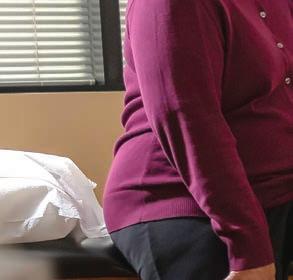
13 minute read
ASSESSORS
e law requires the assessors to value properties every two years. e property valuation homeowners will soon receive is based on June 2022 data, near the recent peak in the realestate market.
So even though home prices have declined since then, property values re ect last year’s exceptional highs. Also at play is a number called the “assessment rate,” another factor that helps determine how much in prop- based at Station 35, per the sheet. It will have 1,500 gallons of water, 200 gallons of aqueous lm forming foam and 500 pounds of Purple-K. e new trucks, which are a bright green-yellow color, have features that allow for a more e cient and e ective way of doing things, Richardson said. One of the biggest updates is an infrared thermal imaging camera.
“We have 360-degree imaging visibility, so in the middle of the night, if we respond on an incident, we can see everything around us. It’s almost like night vision,” he said.
Richardson noted that the equipment on the truck — such as the extrication equipment, fans and saws — are all battery powered.
“We’re using lithium-ion batteries for all of our equipment so that we erty taxes a person owes. e state legislature sets the assessment rate.






JoAnn Gro , Colorado property tax administrator, said she “can pretty well guarantee” that the property tax information homeowners receive next week won’t be accurate.

“It’s because your legislature isn’t immune to what’s going on right now,” Gro said. “ ere’ve been lots of discussions … about providing some additional property value adjustment.”
“I truly expect to see some adjustments and some relief in 2023,” she added.

She also advised the public “to watch every one of your taxing juris- don’t have to use gasoline generators around an aircraft — potential aircraft re,” he said. “ at’s a huge deal.” e airport is purchasing a training simulator, which costs roughly $750,000 and looks like an aircraft, for South Metro Fire Rescue to use, Fronapfel said.

Each truck cost approximately $1 million, and Centennial Airport paid for one of the trucks while South Metro Fire Rescue paid for the other, Fronapfel said.
“We really are excited about this partnership not only with these two vehicles behind me but also with the training simulator that we’re getting in a couple months, hopefully,” Fronapfel said.
“It’s a trainer for putting out res on aircraft,” he said. “ ey have dif- dictions that’s going to have conversations about setting their mill levy.”
Colorado ranks lower
Despite the public concerns over property taxes, Gro noted that “we still have one of the lowest obligations of property taxes of any state.”
Nationally, Colorado has relatively low residential property taxes, according to an analysis by the conservative Tax Foundation. Colorado ranked 47th in property taxes paid as a percentage of owner-occupied housing value in 2020, according to the foundation.
And while businesses pay more, ferent scenarios they could play out with that trainer, so that when they respond it’s just like responding to a real aircraft.” e addition of the new re trucks has been about a two-year process, Richardson said. their taxes still appear to be lower than the national average, according to the Colorado Sun. Colorado had the 17th best “State Business Tax Climate” for 2020, according to the Tax Foundation. Colorado had the 14th best “property tax rank” for businesses in 2020, according to the foundation.
“To see this coming to fruition is — it just, it warms my heart. I get chills. And it’s kind of an indescribable feeling,” Richardson said.
“ is combination of apparatus, … in conjunction with a mobile ARFF re ghting training prop that was just approved for purchase that we will get by the end of the year, enable your ARFF re ghters at South Metro to be the best equipped, and the best trained, and the most sustainable re ghting force of any regional airport in the country,” he added.
Editor’s note: As of press time, Gov. Jared Polis and Democratic legislators said they would announce a “transformative plan” on May 1 to reduce property tax bills and “implement long-term protections” to prevent future increases. e plan would require voter approval in November.

BY NINA JOSS AND MCKENNA HARFORD COLORADO COMMUNITY MEDIA
out Republicans in most key elections. Along with wins in all four statewide elected o ces, including governor, and a U.S. Senate seat, Democrats gained a supermajority in the state House and a majority in the state Senate.
ere seems to be consensus within the Republican Party that unity is needed to start winning. Republicans appear to agree they need an identity, a clear message. e disagreement, however, is exactly what messages to push.
Some want the party to shift focus away from abortion, gun control, the results of the 2020 presidential election and Donald Trump in hopes of appealing to more una liated voters. Others say these topics are exactly what Republicans need to double down on to win.
At the April breakfast, some of those themes played out. Republicans in the room disagreed on how much the party should focus on abortion. While many Republicans share a desire for more restrictions on abortion in Colorado, the question is how much these beliefs should be a part of mainstream messaging.
“It reminds me of an old saying: ‘If you can’t beat them, join them,’” said Bob Andrews, who lost the Arapahoe County assessor race in 2022.
As a “devout Catholic” with “strong opinions about abortion,” Andrews said Republicans need to stop focusing on it.
“We have this abortion albatross around our neck,” he said. “As an assessor candidate, I had to answer questions about abortion. at’s not in my purview. But until we give that up, we’re going to keep losing.”
Others argued the exact opposite is needed, saying the key to winning is to push harder on the controversial social issues that became a focal point of the 2022 elections.
“As a Republican, we’ll never walk away from protecting the unborn, period,” said Randy Corporon, Republican national committeeman and political radio talk show host. “We don’t need to moderate our position. We need to point out how radical the Democrat position is … It’s a wonderful opportunity to stand up for what we believe and convince people why we’re right.” e passion of these comments — and the divisions they brought to the surface — extend far beyond Maggiano’s.
From Arapahoe County, which has a Democratic majority, to rightleaning Douglas County — Republicans nd themselves debating and questioning whether they can come to a consensus on how to present a one-party front to voters.

A numbers game

Last year in Douglas County, a Democrat won a legislative race in the Republican stronghold for the rst time since 1966.
Still, Douglas County elected mostly Republicans to the statehouse, re ecting its voter spectrum. Republicans account for 34% of active registered voters in the county, while 19% are Democrats and 46% are unafliated. (Voters not included in these numbers are registered with minor parties.)

e numbers di erentiate Douglas County from neighboring Arapahoe County, where 21% of active registered voters are Republicans, 31% are Democrats and 46% are una liated.
Kevin Edling, who ran for Arapahoe County sheri against incumbent Democrat Tyler Brown in 2022, said these numbers played a role in his loss.
“I knew before I ran for o ce for the Arapahoe County sheri that we’re behind the eight ball because there’s … more registered Democrats in Arapahoe County than there are Republicans,” he said.
If Edling could have run without choosing a party, he said he would have. Some races feel like they’re already decided down party lines before the candidates even start campaigning, he said.
“ at’s not what it’s supposed to be about,” he said. “It’s supposed to be about ideas and candidates and service.”
In the eyes of many Republicans, party registration numbers played a large role in the GOP’s cache of losses in 2022.
“I campaigned for several of the (November 2022) candidates,” said Arapahoe County Commissioner Je Baker, the lone Republican on the ve-member board. “None of my picks won. But you know … I don’t think they could have done anything better. It’s a mathematics game.”
Party registration numbers in Arapahoe County are similar to those statewide. Just under a quarter of active voters in Colorado are registered Republican and 27% are Democrat.
It is signi cantly more popular, however, to not be registered with any party at all – 46% of voters in the state are una liated, and that percentage has increased over time.
On Nov. 4, 2008, the day Barack Obama was rst elected, Democratic, Republican and una liated voters in Colorado were evenly split, with about 33% of voters registered in each category. Since then, both major party registration percentages have decreased while una liated voters have increased. ere are multiple theories as to why registering as una liated is becoming more common among voters. For some, the shift away from party a liation highlights the declining loyalty to both major political parties and frustration with the two-party political system.
Suzanne Taheri, who was known for much of her political career as Suzanne Staiert, thinks the shift to una liated could also have a systemic cause.
In the past, o cials at the Department of Motor Vehicles would ask residents if they wanted to register to vote and would allow them to select a party.
“Now, they don’t ask you the question anymore,” Taheri said. “You’re just automatically registered as unafliated.”
A new process, implemented in 2020, automatically registers new voters as una liated when they get a driver’s license.
To register with a speci c party, voters have to change their a liation online or by responding to a mailed notice from the state.
“Your motivation to then go into the system and change your a liation to something else is much lower,” said Taheri, the former chair of the Arapahoe County GOP. “Like why? What is the bene t? Now we have open primaries, a either. or one. see ing hall County forced choose would registration Republicans elections their that are we they sure that ated una choice,” di comes registered switch, the … would your o a choose Democratic leading una party primary, 33% recent Democratic lican. cies, the the Republican tal ing the state’s primaries, and if you don’t register as a Republican, then you can vote in either. If you register as a Republican or a Democrat, you only get to pick one. So I don’t know that we will ever see (party registration) really increasing in Colorado.”

In March, during a Republican town hall event in Castle Rock, one Douglas County resident said if voters were forced to pick a party, more would choose the right and Republicans would fare better in elections and registration numbers.
With the growing number of unafliated voters in the state, many Republicans say the key to winning elections is getting these voters on their side.
“We need to make sure they know that not all Republicans look like me, are old white guys,” Baker said. “ at we have folks that are BIPOC, that they are LGBTQ+. We need to make sure that we’re addressing the issues that they nd important.”
But in Taheri’s eyes, not all una liated voters are “up for grabs.”
“We’re not necessarily appealing to una liated (voters) — they’re unafliated by default, not necessarily by choice,” she said. “I think there’s a big di erence between someone who comes here who’s a Democrat, gets registered as una liated and doesn’t switch, versus somebody who made the switch from a party to una liated … If they were truly up for grabs, I would say, you know, you have to sell your issues to them.”
According to the secretary of state’s o ce, una liated voters can choose a party preference, meaning they can choose to receive a ballot for only the Democratic or Republican primary leading up to an election. Of the una liated voters who have chosen a party preference since the June 2022 primary, 59% chose Democratic and 33% chose Republican.
Voter preference numbers for other recent primaries also show more Democratic preferences than Republican.
Despite these blue-leaning tendencies, many una liated voters, with the ability to vote for either party in the primaries, choose to vote on the Republican ballot.
In the 2022 primaries, 1.2 million total votes were cast, according to numbers from the secretary of state’s of- ce. According to the o ce’s data, 248,192 una liated voters returned Republican ballots and 170,631 cast their ballots in Democratic primaries. With una liated voters impacting primary races, some Republicans support closing primary elections to only registered GOP voters. ey say this would compel people who want to participate to register with the party.
“As members of our community who have knocked countless doors and engaged untold numbers of residents, we know una liated voters are more aligned with conservative values than not,” Douglas County GOP Chair Steve Peck said in a statement. “We hope to prove the value of Republicanism to them over time and have them join our family to take part in our primary elections as registered Republicans themselves.”
Arapahoe County GOP chair Anne Rowland thinks the party can bring more voters in by selling their issues and, more importantly, by building relationships.
“If we’re going to win, we must work together,” she said. “And not only do we have to work together, but we have to persuade una liated and moderate Democrats. Otherwise we’re gonna lose every time.”
The drivers of division
In Rowland’s experience, there are two main causes of division within the party. Some Republicans, she said, are divided in their grassroots versus establishment attitudes. e other division in the party, Rowland said, is about how much weight to put on speci c issues.
“Some of us are divided because there’s an issue or another that we’re personally attached to, and that overrules everything,” she said.
During the Arapahoe County Republicans Breakfast in April, the issue dividing the crowd was abortion.

Gun control, contesting the results of the 2020 presidential election and Trump also cause divisions among Republicans.
During a debate leading up to the 2023 GOP state chair election, in which Dave Williams was elected, several candidates said they believe Trump won the 2020 election and the party needs to focus on transparency and election security.
“We need to be bold, we need to stand up,” said then candidate Aaron Wood. “We need to not be afraid of people calling us ‘the Big Lie’ or ‘election deniers’ — Trump won. Plain and simple … I want to see without a doubt that elections are won legitimately and we need to be proponents of that.”
In 2020, President Joe Biden was declared the winner with 306 Electoral College votes and just over 81.2 million popular votes. According to the o cial results, Trump nished with 232 Electoral College votes and just over 74.2 million citizen votes.
Williams also believes Trump won the 2020 election.
When running for the state legislature in 2022, he led a lawsuit to try to force Colorado Secretary of State Jena Griswold to allow his name to be listed on the primary ballot as “Dave ‘Let’s Go Brandon’ Williams,” using a coded phrase that means “F--- Joe Biden.”
A judge ruled that Griswold had the authority to disallow the use of the phrase.
Erik Aadland, another candidate for the state’s GOP chair position and former congressional candidate, said election integrity is important, but focusing so much on the 2020 results is hurting the party.
“ is rehashing 2020 is not serving Republicans,” he said. “Whether fraud dictated a role in the outcome of 2020, well sadly, we’ll never know, folks … Our republic hangs in the balance, and if we keep trying to ght 2020 over and over again, we’re going to lose this war.”
Tina Peters, a 2023 state chair candidate and former Mesa County clerk who was indicted last year on charges related to a security breach of the county’s election system, said focus- ing on the results is important for the party going forward.
“We need to learn from the past,” she said.
Peters was also recently convicted of obstructing government operations after an encounter in which police said she resisted investigators when they tried to seize an iPad that she had used to record a court proceeding.
Williams said he has o ered the six other candidates who ran for Colorado GOP chair, including Peters, titles and roles within the state party, as reported by e Colorado Sun.

Taheri said di ering perspectives on the 2020 election results are causing Republicans to turn against each other.
“I think what is driving the wedge in the party is that there is a group who doesn’t want to really talk about (other issues), they just want to talk about stolen elections and they want to sling mud at, not just the Democrats, but other people in the party that don’t want to talk about their issue,” she said.
For the party to be successful, Taheri said she thinks it needs to move away from Trump. Because of his prominent role in people’s perception of the party, she said his in uence trickles down to how people vote in local elections.
“ e saying used to be ‘All politics is local,’” she said. “Now I feel like all politics is national … I think if we are better at the federal level of articulating our issues, then people start to identify our candidates with our issues instead of just identifying our candidates with Trump.”
For other Republican voices and voters, Trump is the only way forward for the GOP.
During a March town hall hosted by several state House Republicans, several Douglas County citizens said Trump is the best choice to x not only the party, but also the country. When asked if they would only support Trump, the Castle Pines and Castle Rock residents said they would support whoever wins the Republican primary.
Unifying issues
To move forward as a party, some Republicans think the key to winning is to focus on the issues that a ect voters’ day-to-day lives.
“I don’t like to lead with (abortion and gun rights) because those are hot-button issues,” Rowland said.
“If it’s a topic that’s very partisan, I don’t think that’s where you start the conversation. I think you hold your values, but start with the things that you can agree on.”
In Rowland’s eyes, some of those things are crime, in ation, homelessness, school violence and fentanyl.
“ ese are all issues that should not be Republican or Democrat issues,” she said. “ ese are not partisan issues. ese are issues of life and community.”
Rep. Anthony Hartsook, R-Parker,






